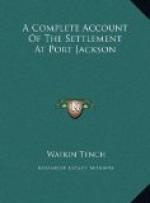[Mrs. Johnson, wife of the chaplain of the settlement, was so pleased with this name that she christened her little girl, born in Port Jackson, Milba Maria Johnson.]
Of compound words they seem fond. Two very striking ones appear in the journal to the Hawkesbury. Their translations of our words into their language are always apposite, comprehensive, and drawn from images familiar to them. A gun, for instance, they call ‘gooroobeera’, that is, a stick of fire. Sometimes also, by a licence of language, they call those who carry guns by the same name. But the appellation by which they generally distinguished us was that of ‘bereewolgal’, meaning men come from afar. When they salute any one they call him ‘dameeli’, or namesake, a term which not only implies courtesy and good-will, but a certain degree of affection in the speaker. An interchange of names with any one is also a symbol of friendship. Each person has several names; one of which, there is reason to believe, is always derived from the first fish or animal which the child, in accompanying its father to the chase or a fishing, may chance to kill.
Not only their combinations, but some of their simple sounds, were difficult of pronunciation to mouths purely English. Diphthongs often occur. One of the most common is that of ‘ae’, or perhaps, ‘ai’, pronounced not unlike those letters in the French verb ‘hair’, to hate. The letter ‘y’ frequently follows ‘d’ in the same syllable. Thus the word which signifies a woman is ‘dyin’; although the structure of our language requires us to spell it ‘deein’.
But if they sometimes put us to difficulty, many of our words were to them unutterable. The letters ‘s’ and ‘v’ they never could pronounce. The latter became invariably ‘w’, and the former mocked all their efforts, which in the instance of Baneelon has been noticed; and a more unfortunate defect in learning our language could not easily be pointed out.
They use the ellipsis in speaking very freely; always omitting as many words as they possibly can, consistent with being understood. They inflect both their nouns and verbs regularly; and denote the cases of the former and the tenses of the latter, not like the English by auxiliary words, but like the Latins by change of termination. Their nouns, whether substantive or adjective, seem to admit of no plural. I have heard Mr. Dawes hint his belief of their using a dual number, similar to the Greeks, but I confess that I never could remark aught to confirm it. The method by which they answer a question that they cannot resolve is similar to what we sometimes use. Let for example the following question be put: ’Waw Colbee yagoono?’—Where is Colbee to-day? ’Waw, baw!’—Where, indeed! would be the reply. They use a direct and positive negative, but express the affirmative by a nod of the head or an inclination of the body.




